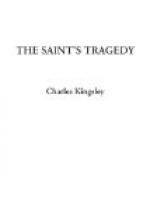P. 149. ‘Lest he fall.’ Cf. Fleury, Eccl. Annals, in Anno 1233. ’Doctor Conrad of Marpurg, the King Henry, son of the Emperor Frederick, etc., called an Assembly at Mayence to examine persons accused as heretics. Among whom the Count of Saym demanded a delay to justify himself. As for the others who did not appear, Conrad gave the cross to those who would take up arms against them. At which these supposed heretics were so irritated, that on his return they lay in wait for him near Marpurg, and killed him, with brother Gerard, of the order of Minors, a holy man. Conrad was accused of precipitation in his judgments, and of having burned trop legerement under pretext of heresy, many noble and not noble, monks, nuns, burghers, and peasants. For he had them executed the same day that they were accused, without allowing any appeal.’
P. 150. ‘The Kaiser.’ Cf. Lib. VIII. section 12, for a list of the worthies present.
P. 151. ‘A Zingar wizard.’ Cf. Lib. I. section 1. The Magician’s name was Klingsohr. He has been introduced by Novalis into his novel of Heinrich Von Ofterdingen, as present at the famous contest of the Minnesingers on the Wartburg. Here is Dietrich’s account:—
’There was in those days in the Landgrave’s court six knights, nobles, etc. etc., “cantilenarum confectores summi,” song-wrights of the highest excellence’ (either one of them or Klingsohr himself was the author of the Nibelungen-lied and the Heldenbuch).
’Now there dwelt then in the parts of Hungary, in the land which is called the “Seven Castles,” a certain rich nobleman, worth 3000 marks a year, a philosopher, practised from his youth in secular literature, but nevertheless learned in the sciences of Necromancy and Astronomy. This master Klingsohr was sent for by the Prince to judge between the songs of these knights aforesaid. Who, before he was introduced to the Landgrave, sitting one night in Eisenach, in the court of his lodging, looked very earnestly upon the stars, and being asked if he had perceived any secrets, “Know that this night is born a daughter to the King of Hungary, who shall be called Elizabeth, and shall be a saint, and shall be given to wife to the son of this prince, in the fame of whose sanctity all the earth shall exult and be exalted.”
’See!—He who by Balaam the wizard foretold the mystery of his own incarnation, himself foretold by this wizard the name and birth of his fore-chosen handmaid Elizabeth.’ (A comparison, of which Basnage says, that he cannot deny it to be intolerable.) I am not bound to explain all strange stories, but considering who and whence Klingsohr was, and the fact that the treaty of espousals took place two months afterwards, ‘adhuc sugens ubera desponsata est,’ it is not impossible that King Andrew and his sage vassal may have had some previous conversation on the destination of the unborn princess.
P. 151. ‘A robe.’ Cf. Lib. II. section 9, for this story, on which Dietrich observes, ’Thus did her Heavenly Father clothe his lily Elizabeth, as Solomon in all his glory could not do.’




